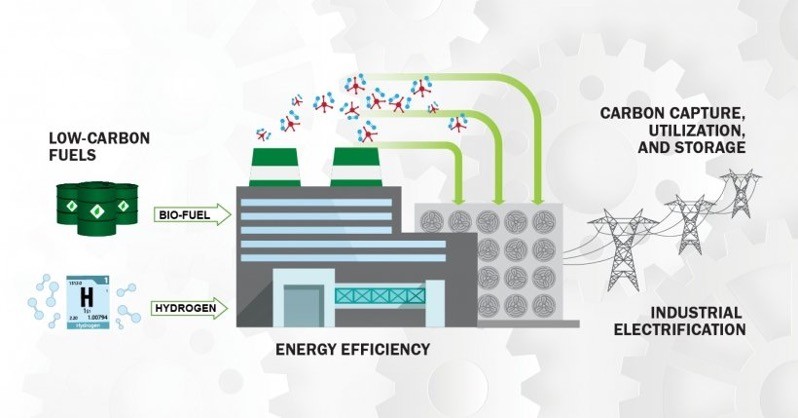
Author: Sagar K. Chourasia at NITISARA
In the era of climate change awareness and sustainability imperatives, the supply chain industry finds itself at a critical juncture. The imperative to decarbonize is not just a lofty goal; it’s a strategic necessity. With the recent conclusion of the UAE COP 28, the mobilization of the $1 trillion dirham in sustainable finance, announcement of loss-damage fund, would dynamically churn the legacy industries towards sustainability standards. In this comprehensive exploration, we will delve into the essential components of a decarbonization roadmap for the legacy supply chain industry. Furthermore, we’ll examine the role of emerging forums in driving and facilitating the decarbonization process.
The Decarbonisation Imperative: Understanding Decarbonisation
Decarbonisation involves reducing or eliminating carbon dioxide emissions, a critical step in mitigating climate change. In the supply chain industry, decarbonisation is the process of transitioning from traditional, carbon-intensive practices to more sustainable and eco-friendly alternatives. The legacy supply chain industry, characterized by traditional practices and established infrastructure, is a significant contributor to carbon emissions. Decarbonizing this sector is crucial for achieving broader sustainability goals and minimizing environmental impact.
Components of a Decarbonisation Roadmap:
1. Comprehensive Carbon Footprint Assessment:
- Undertake a thorough assessment of the current carbon footprint of the supply chain. Identify emission hotspots across transportation, storage, and distribution channels.
2. Data-Driven Decision Making:
- Leverage data analytics to make informed decisions on emission reduction strategies. Data-driven insights enable targeted interventions for maximum impact.
3. Technology Integration:
- Embrace innovative technologies such as Internet of Things (IoT), Artificial Intelligence (AI), and blockchain for enhanced supply chain visibility. Implementing these technologies improves efficiency and allows for more precise emissions monitoring.
4. Energy Transition:
- Shift from fossil fuel-dependent energy sources to renewable alternatives such as solar, wind, or bioenergy. Invest in energy-efficient technologies and practices to minimize the carbon footprint of operations.
5. Green Technologies Adoption:
- Embrace eco-friendly technologies, including electric vehicles, energy-efficient machinery, and smart logistics solutions. Implementing state-of-the-art technologies can enhance operational efficiency while reducing environmental impact.
6. Supply Chain Optimization:
- Streamline supply chain processes to minimize waste, reduce excess inventory, and optimize transportation routes. Lean and efficient supply chain practices inherently contribute to lower carbon emissions.
7. Carbon Offsetting Programs:
- Engage in carbon offsetting initiatives, such as reforestation projects or investment in renewable energy projects.These programs help neutralize the unavoidable carbon emissions, making the supply chain more environmentally responsible.
8. Collaboration and Industry Standards:
- Collaborate with industry partners and stakeholders to establish and adhere to sustainable practices. Supporting and following industry standards ensures a unified approach to decarbonization.

Role of Emerging Forums in Decarbonisation:
1. International Sustainability Forums:
- Consortia like the Sustainable Supply Chain Foundation bring together industry players to share best practices and collaborate on sustainability initiatives.These forums provide a platform for sharing best practices, learning from global initiatives, and establishing a unified commitment to decarbonization.
2. Technology and Innovation Hubs:
- Engage with technology and innovation hubs to stay abreast of the latest advancements in sustainable logistics technologies.
- These hubs foster collaboration, enabling legacy supply chain players to integrate cutting-edge solutions into their operations.
3. Green Supply Chain Networks:
- Join or establish green supply chain networks that prioritize eco-friendly practices.
- Networking within these forums provides opportunities for collaboration, knowledge exchange, and the collective pursuit of decarbonization goals.
4. Policy Advocacy Platforms:
- Participate in forums advocating for supportive policies that incentivize and accelerate decarbonization efforts.
- Active involvement in policy discussions ensures that the industry’s interests align with broader sustainability goals.
5. Carbon Disclosure Initiatives:
- Participation in programs like the Carbon Disclosure Project (CDP) encourages transparency and benchmarking against industry peers.
- These initiatives drive accountability and motivate continuous improvement.
6. Green Logistics Forums:
- Forums specifically focused on green logistics, such as the Green Logistics Forum, provide a platform for knowledge exchange.
- Participation in these forums facilitates learning from successful case studies and the implementation of best practices.
7. Industry-Specific Sustainability Platforms:
- Platforms like the Sustainable Apparel Coalition for the fashion industry or the Clean Cargo Working Group for maritime logistics offer tailored solutions.
- Industry-specific forums address unique challenges and foster targeted sustainability efforts.

Success Stories in Decarbonization:
Amazon’s Climate Pledge: Amazon committed to achieving net-zero carbon emissions by 2040. The company pledged to invest in sustainable technologies and renewable energy sources across its vast supply chain.
Unilever’s Sustainable Living Plan: Unilever’s plan includes a commitment to making its entire supply chain carbon neutral by 2039. The company actively engages suppliers and partners in its sustainability journey.
Conclusion:
As the legacy supply chain industry stands on the precipice of transformation, the decarbonization roadmap is not just a strategic plan; it’s a commitment to a sustainable future. The integration of green technologies, optimization of supply chain processes, engagement in carbon offsetting programs, and collaboration with emerging forums collectively shape a sustainable path forward.
The role of international sustainability forums, technology and innovation hubs, green supply chain networks, and policy advocacy platforms is paramount. These forums provide the necessary support, knowledge exchange, and collaborative frameworks that can catalyze the decarbonization efforts of the legacy supply chain industry.
In embracing this comprehensive approach to decarbonization, the legacy supply chain industry has the opportunity not only to reduce its environmental impact but also to foster innovation, resilience, and competitiveness in the evolving landscape of sustainable business practices.
